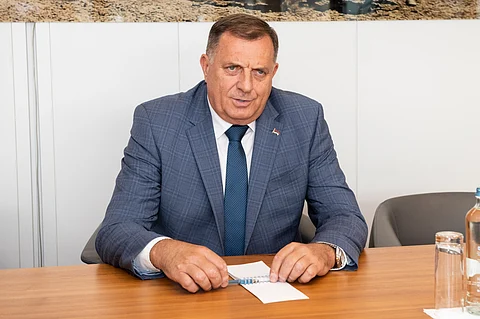

Bosnia’s electoral authorities have stripped Milorad Dodik of his role as president of Republika Srpska, the Serb-majority entity in Bosnia, following a court verdict that sentenced him to one year in prison and banned him from political activity for six years.
In February, a Sarajevo court convicted Dodik for failing to comply with decisions made by the international envoy overseeing Bosnia’s 1995 Dayton Accords, which ended the Bosnian War.
The appeals court upheld this ruling on Friday, confirming Dodik’s one-year prison sentence and six-year political ban, leading to the Central Electoral Commission’s decision to revoke his mandate.
Commission member Suad Arnautovic explained that the law mandates the removal of elected officials sentenced to more than six months in jail, with an early election for the Republika Srpska presidency to be held within 90 days after the appeals period.
Dodik, a pro-Russian nationalist who has long advocated for Republika Srpska’s secession to join Serbia, rejected the court’s decision, vowing to continue his duties as president with the support of the Bosnian Serb parliament.
His legal team, led by lawyer Goran Bubic, plans to appeal to Bosnia’s Constitutional Court to suspend the sentence and political ban.
“Surrender is not an option,” Dodik declared on X, signaling his intent to challenge the ruling and maintain his political influence despite the electoral commission’s decision.
The Bosnian Serb government labeled the court ruling “unconstitutional and politically motivated,” dismissing its legitimacy.
Dodik has garnered support from Serbian President Aleksandar Vucic, Hungarian Prime Minister Viktor Orban, and Russian allies, who also view the verdict as politically driven.
The European Union, however, stressed that the “verdict is binding and must be respected,” highlighting Bosnia’s stalled progress toward EU membership due to Dodik’s separatist actions.
Dodik’s repeated clashes with international envoy Christian Schmidt and his defiance of state-level institutions have deepened Bosnia’s political crisis, raising fears of instability in a country still shaped by the 1992-95 war that killed 100,000 and displaced millions.
The Dayton Accords created two autonomous regions — Republika Srpska and the Bosniak-Croat Federation — with a rotating three-member presidency to maintain ethnic balance.
Dodik’s push for separatism has drawn U.S. sanctions and heightened tensions, particularly among Bosniaks, as Bosnia navigates its fragile multi-ethnic framework.